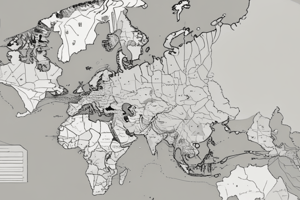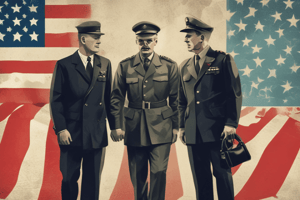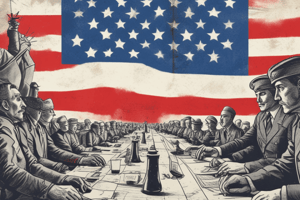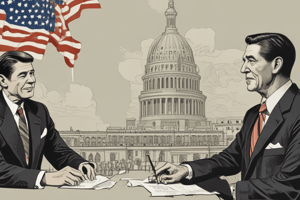Podcast
Questions and Answers
True or false: The collapse of the USSR marked the end of the Cold War.
True or false: The collapse of the USSR marked the end of the Cold War.
True (A)
True or false: The US became the sole superpower after the collapse of the USSR.
True or false: The US became the sole superpower after the collapse of the USSR.
True (A)
True or false: Unipolarity refers to the unrivaled extent and many dimensions of US power.
True or false: Unipolarity refers to the unrivaled extent and many dimensions of US power.
True (A)
True or false: The United Nations, GATT (WTO from 1995), the World Bank, and the IMF are Western-dominated institutions created after the Second World War.
True or false: The United Nations, GATT (WTO from 1995), the World Bank, and the IMF are Western-dominated institutions created after the Second World War.
True or false: The American Hegemony refers to the holding by one state of a preponderance of power in the international system.
True or false: The American Hegemony refers to the holding by one state of a preponderance of power in the international system.
True or false: Hegemonic stability theory suggests that the existence of a hegemon explains the stability of the system.
True or false: Hegemonic stability theory suggests that the existence of a hegemon explains the stability of the system.
True or false: The collapse of the USSR meant that the West had won the Cold War.
True or false: The collapse of the USSR meant that the West had won the Cold War.
True or false: The collapse of the USSR led to a multipolar global system.
True or false: The collapse of the USSR led to a multipolar global system.
True or false: The post-Cold War order was characterized by a bipolar system.
True or false: The post-Cold War order was characterized by a bipolar system.
True or false: The collapse of the USSR happened in the 1990s.
True or false: The collapse of the USSR happened in the 1990s.
Multilateralism is a policy of acting alone without the involvement of other states or international organizations.
Multilateralism is a policy of acting alone without the involvement of other states or international organizations.
Multipolarity refers to an international system with two power centers.
Multipolarity refers to an international system with two power centers.
Neorealists argue that multipolarity leads to stability and a decreased likelihood of war.
Neorealists argue that multipolarity leads to stability and a decreased likelihood of war.
Liberals argue that a multipolar system promotes peace, cooperation, and integration.
Liberals argue that a multipolar system promotes peace, cooperation, and integration.
Anarchical multipolarity is characterized by fluidity and uncertainty.
Anarchical multipolarity is characterized by fluidity and uncertainty.
Interdependent multipolarity is characterized by a more even division of global power.
Interdependent multipolarity is characterized by a more even division of global power.
The rising power club consists of the USA, EU, and Japan.
The rising power club consists of the USA, EU, and Japan.
The rising power club consists of China, India, and Brazil.
The rising power club consists of China, India, and Brazil.
The rising power club consists of Russia, South Africa, and Australia.
The rising power club consists of Russia, South Africa, and Australia.
The rising power club consists of Germany, Japan, and Mexico.
The rising power club consists of Germany, Japan, and Mexico.
True or false: The liberal Greater West is expected to increase its global reach through the combination of soft power and hard power.
True or false: The liberal Greater West is expected to increase its global reach through the combination of soft power and hard power.
True or false: The United States has been a revisionist power since the end of the Cold War.
True or false: The United States has been a revisionist power since the end of the Cold War.
True or false: The decline of American power has been described using various terms such as 'multipolar', 'polycentric', and 'post-American'.
True or false: The decline of American power has been described using various terms such as 'multipolar', 'polycentric', and 'post-American'.
True or false: Respect for sovereignty alone is sufficient to maintain order in an age defined by global challenges.
True or false: Respect for sovereignty alone is sufficient to maintain order in an age defined by global challenges.
True or false: Haass calls for adopting a new approach to sovereignty that emphasizes obligations and responsibilities rather than just rights and protections.
True or false: Haass calls for adopting a new approach to sovereignty that emphasizes obligations and responsibilities rather than just rights and protections.
True or false: Hegemonic status is based on the control of economic and military resources, enabling the hegemon to shape the preferences and actions of other states.
True or false: Hegemonic status is based on the control of economic and military resources, enabling the hegemon to shape the preferences and actions of other states.
True or false: Unipolarity refers to an international system with multiple preeminent states.
True or false: Unipolarity refers to an international system with multiple preeminent states.
True or false: Critics argue that unipolarity promotes megalomania on the part of the dominant actor.
True or false: Critics argue that unipolarity promotes megalomania on the part of the dominant actor.
True or false: Unilateralism refers to a policy determined by the interests and objectives of a single state, unconstrained by other states.
True or false: Unilateralism refers to a policy determined by the interests and objectives of a single state, unconstrained by other states.
Flashcards are hidden until you start studying
Study Notes
Post-Cold War Era
- The collapse of the USSR marked the end of the Cold War.
- The US became the sole superpower after the collapse of the USSR.
- Unipolarity refers to the unrivaled extent and many dimensions of US power.
International Institutions
- The United Nations, GATT (WTO from 1995), the World Bank, and the IMF are Western-dominated institutions created after the Second World War.
Hegemony and Stability
- The American Hegemony refers to the holding by one state of a preponderance of power in the international system.
- Hegemonic stability theory suggests that the existence of a hegemon explains the stability of the system.
Post-Cold War Order
- The collapse of the USSR meant that the West had won the Cold War.
- The collapse of the USSR led to a unipolar global system, not a multipolar or bipolar system.
- The post-Cold War order was characterized by a unipolar system.
Multipolarity
- Multipolarity refers to an international system with multiple power centers.
- Neorealists argue that multipolarity leads to instability and an increased likelihood of war.
- Liberals argue that a multipolar system promotes conflict and competition, not peace and cooperation.
Rising Powers
- The rising power club consists of China, India, and Brazil.
Global Reach and Power
- The liberal Greater West is expected to increase its global reach through the combination of soft power and hard power.
- The United States has not been a revisionist power since the end of the Cold War.
- The decline of American power has been described using various terms such as 'multipolar', 'polycentric', and 'post-American'.
Sovereignty and Order
- Respect for sovereignty alone is not sufficient to maintain order in an age defined by global challenges.
- Haass calls for adopting a new approach to sovereignty that emphasizes obligations and responsibilities rather than just rights and protections.
Hegemony and Unipolarity
- Hegemonic status is based on the control of economic and military resources, enabling the hegemon to shape the preferences and actions of other states.
- Unipolarity refers to an international system dominated by one powerful state, not multiple preeminent states.
- Critics argue that unipolarity promotes megalomania on the part of the dominant actor.
- Unilateralism refers to a policy determined by the interests and objectives of a single state, unconstrained by other states.
Studying That Suits You
Use AI to generate personalized quizzes and flashcards to suit your learning preferences.




